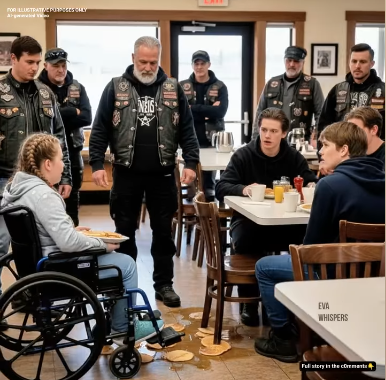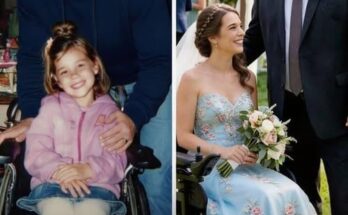
A Morning on Maple Street
Sun pooled through the diner’s front windows, catching on chrome napkin holders and fogging the glass of coffee pots. Maple Street Diner smelled like pancakes and butter and the kind of bacon that snaps. Most days, it was a place where regulars argued about ball scores and nobody raised their voice.
Maya parked her wheelchair beside a corner booth, hands steady, smile careful. Sixteen going on steel, she’d learned the choreography of stares—how to ignore the long ones and outlast the quick ones. She cut into a short stack, syrup slow as honey.
At the next table, four boys filled the silence with noise. Loud. Bored. Looking for a target. One “accidentally” elbowed Maya’s wheel. Another slid his plate off the table so pancakes slapped tile, syrup splashing her sneaker.
Laughter burst like a dropped tray.
Forks paused. Conversations stalled mid-sentence. The cook stopped mid-flip, griddle hissing alone. Maya blinked fast, jaw set, humiliation heavy as a coat.
Nobody moved. Eyes sank to plates. A whole room let cruelty take the microphone.
The Sound That Bent the Air
Time crawled. The door bell chimed. The diner tried to restart itself.
Then, low and layered, came the sound that changes posture—the roll of engines out in the lot, a dozen throats of thunder settling into idle. Heads rose despite themselves.
The door swung wide. Boots crossed tile. Not trouble—presence. Leather jackets scuffed by miles; patches threaded with eagles and flags; faces lined by weather and years that had taught them how to stand their ground without shouting. They scanned, the way protectors do.
Their gaze found Maya. The air shifted—fear stepping back to make room for something steadier.
A Lesson Without a Shout
One of the men—tall, gray at the beard, eyes the color of worn denim—took off his gloves at the boys’ table. He didn’t puff up. He didn’t crowd. He rested both hands on the back of an empty chair.
“Morning,” he said, calm as a slow river. “Looks like y’all forgot your manners.”
Chairs creaked. Shoes scraped tile. The boys tried to smirk and found their mouths didn’t know how.
“Pick it up,” he added, a nod toward the mess. “And start with ‘we’re sorry.’ Loud enough for the person you hurt to hear.”
They moved—pancakes gathered, syrup wiped, napkins binned. One by one they turned to Maya, eyes hot with shame.
“I’m sorry,” the first boy said, voice small.
“Me too,” the second echoed.
The gray-bearded man crouched beside Maya’s booth so his eyes met hers, not her wheels. “You okay?” he asked, voice gentling.
She swallowed, nodded once. “I will be.”
“Good,” he said. “You’re not alone in here.”
He stood and glanced around the room—not a threat, just a reminder that courage is contagious. The diner breathed again.
What Kindness Looks Like in Public
The newcomers fanned out—not to intimidate, but to set a new tempo. One man fetched a mop and finished what the boys had started, whistling a tune that didn’t need lyrics. A woman in a leather vest slid into the booth across from Maya and asked, “Blueberries or chocolate chips?” When Maya blinked, she smiled. “For the replacement pancakes.”
“Blueberries,” Maya said, and it came out almost like a laugh.
The owner hustled from behind the counter, cheeks pink. “Miss Maya, your breakfast is on me. And—” He cleared his throat, looking at the boys. “This place won’t ever be quiet for the wrong reasons again.”
A kid in a football hoodie stood from the back booth and carried two waters to Maya’s table, hands trembling. “I should’ve said something,” he mumbled. “I didn’t. I’m sorry too.”
Maya’s shoulders dropped a fraction, like a weight had shifted its grip.
The Moment That Stayed
When the fresh plate arrived—pancakes jeweled with blueberries—the gray-bearded man rested a receipt under it. “Community tab,” he said. “We keep one running for moments that need a little extra.”
Maya touched the edge of the paper. “Thank you,” she said.
He nodded toward her chair. “My niece rolls,” he offered simply. “Taught me to see. Don’t let fools shrink your world.”
The boys asked to leave. The man behind the counter said, “You can stay—after you bus the back three tables.” They did, quiet now, sleeves sticky with syrup, learning a lesson their parents hadn’t taught them yet.
Conversations restarted, but different—softer, braver. Someone at the counter said, “My sister uses a walker; I should’ve stood sooner.” Someone else said, “Next time, we don’t wait for engines.”
Maya’s hands stopped shaking. Her laugh, when it came, sounded like the clink of ice in a summer glass.
What the Room Remembered
When the group finally rose to go, they didn’t ask for thanks. They left a note under Maya’s saucer: Respect isn’t charity. It’s baseline. — Road Guardians
Outside, the engines caught. Inside, the diner felt like itself again—but taller.
Maya looked at the window and saw her reflection lined up with everyone else—counter stool regulars, the kid in the hoodie, the owner wiping his eyes with a dish towel—and realized she wasn’t a fragile corner of the room. She was the center of a circle that held.
Later, when she told the story, she wouldn’t talk about leather or boots or noise. She’d talk about how the room changed shape, how silence yielded, how strangers decided to be neighbors.
Sometimes all it takes is one clear act to recalibrate a crowd. To remind people that goodness isn’t extinct; it’s just waiting for somebody to go first.
Note: This is a work of fiction inspired by real moments of public courage. Names, details, and events have been altered. Any resemblance is coincidental. Images are for illustration only.


